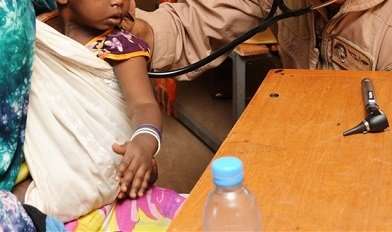Children in sub-Saharan African settings with uncomplicated fever may be safely managed with conditional, rather than universal, three-day follow-up. Credit: Joe Succaro, US Air Force
Children in sub-Saharan African settings with uncomplicated fever may be safely managed with conditional, rather than universal, 3-day follow-up with a community health worker (CHW), according to two cluster-randomized, community-based non-inferiority trials published this week in PLOS Medicine. The trials, conducted by Luke C. Mullany of the Johns Hopkins Bloomberg School of Public Health, Baltimore, Maryland, United States, and Karin Källander of Malaria Consortium, London, United Kingdom and the Karolinska Institutet, Stockholm, Sweden, and their colleagues, suggest that current World Health Organization (WHO) guidance for these children could be reconsidered.
The WHO's integrated community case management (iCCM) guidelines recommend that all children presenting with uncomplicated fever and no danger signs return for follow-up on day 3 following the initial consultation on day 1. Such fevers often resolve rapidly, however, and previous studies suggest that expectant home care for uncomplicated fever can be safely recommended. In the two trials, conducted at sites in the Democratic Republic of the Congo (DRC) and in Ethiopia, each with approximately 4000 participants, results suggest that conditional follow-up is non-inferior to universal follow-up for these children. In Mullany and colleagues' primary analysis in DRC, failure at day 8 (caregiver-reported fever, malaria, diarrhea, pneumonia, or decline of health status) was similar (difference: -0.7%, 95% CI: ??, 4.1%) in the conditional follow-up group (n = 188, 9.7%) compared to the universal follow-up group (n = 230, 10.4%). In Källander and colleagues' analysis in Ethiopia, failure at day 8 was also similar (difference: ?3.81%, 95% CI ??, 0.65%) in the conditional follow-up group (n = 16, 0.8%) compared to the universal follow-up group (n = 90, 4.6%).
The primary result from Källander and colleagues' trial in Ethiopia meets the pre-specified non-inferiority criterion, while Mullany and colleagues' trial results from the DRC suggest that any difference in failures is small. Additional trials in other sub-Saharan African settings are needed to establish generalizability. However, taken together, the current results provide evidence relevant to formulation of WHO recommendations. Källander and colleagues state, "Allowing CHWs to advise caregivers to bring children back only in case of continued symptoms might be a more efficient use of resources in these settings."
More information: Mullany LC, van Boetzelaer EW, Gutman JR, Steinhardt LC, Ngoy P, Barbera Lainez Y, et al. (2018) Universal versus conditional day 3 follow-up for children with non-severe unclassified fever at the community level in the Democratic Republic of the Congo: A cluster-randomized, community-based non-inferiority trial. PLoS Med 15(4): e1002552. doi.org/10.1371/journal.pmed.1002552
Journal information: PLoS Medicine
Provided by Public Library of Science




















